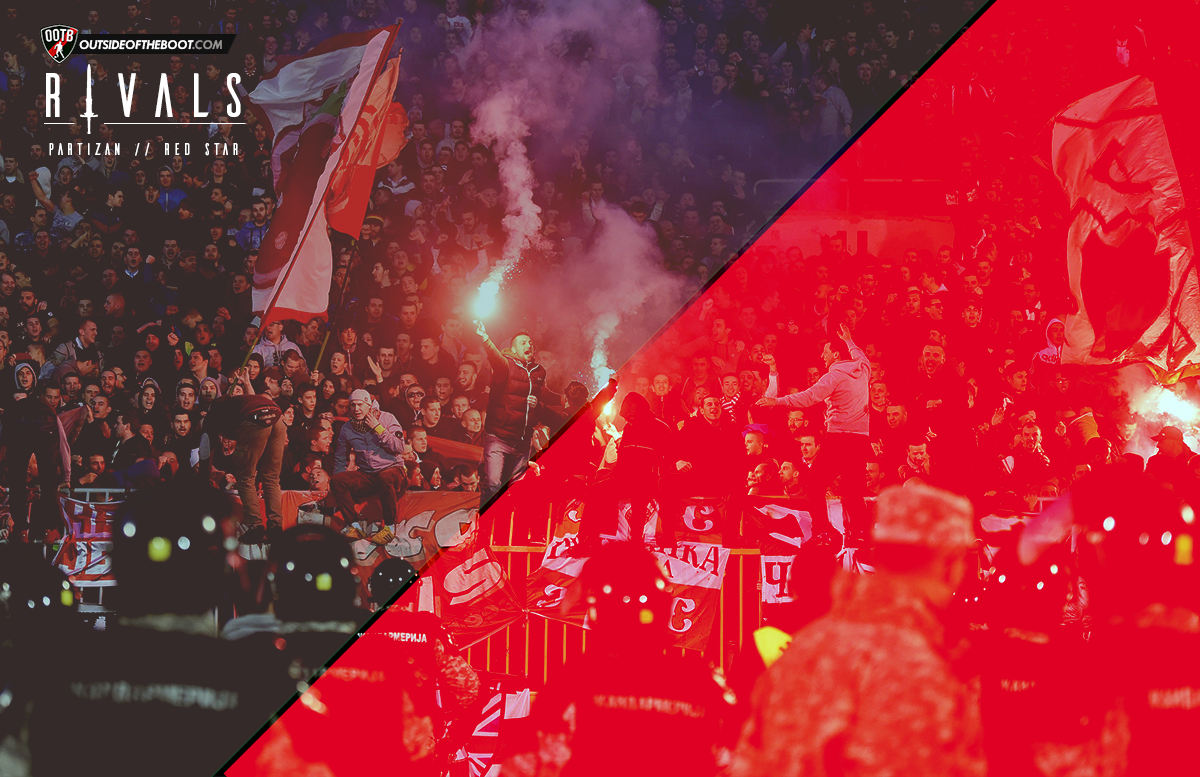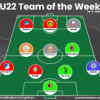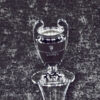
As with almost every other rivalry in football, in fact in any sport, there is a heady mixture of geographic, social, and sporting history that defines a fixture. Jonathan Foreman looks at Red Star vs Partizan.
Passion. Politics. Football. The Belgrade Derby, also known as The Eternal Derby embodies these three simple words perfectly diffusing to create a special spectacle unlike any other. This intense derby played between Serbia’s two biggest football clubs, Partizan and Red Star, has gained a great deal of popularity in Serbia because of their combined 53 domestic league titles and international acclaim for an excessively unruly fan base. This rivalry has a very interesting history yet the single biggest issue the two sets of fans will always have is which one of the clubs is truly the best in Serbia.
On March 4, 1945 Red Star Belgrade was founded by the United Association of Anti Fascist Youth of Serbia. Exactly 5 months later Partizan Belgrade was founded by Yugoslav People’s Army. The first Belgrade Derby was played on January 5, 1947 with Red Star winning the match 4-3. The very next match Partizan won 1-0 and the derby has been back and forth ever since. Even at this early stage in the derby’s history the tension between the two sets of fans was there. The tension’s catalyst, other than their stadiums being one kilometer away from each other, was and always has been predominantly political.

Throughout the history of Serbia there has been a debate as to whether or not they should be their own country or part of one unified Yugoslavia. This debate and other issues have caused a substantial amount of violence throughout history culminating in the breakup of Yugoslavia in 1992. This debate has also been the central factor as to why fans of Partizan and Red Star, known as the Grobari and Delije respectively, hate each other so much. For the most part the Grobari are proponents of one united country and the Delije think that all of Yugoslavia should be under Serbian control.
The history of political violence in Serbia further explains why the events seen in the stands at the derby is so tumultuous. The fans treat the match as an opportunity to vent and get away from the turmoil they see in their daily lives. Others see the match as a place where they can battle against their ideological opponents. Fans can almost always be seen fighting, taunting each other, and brandishing flares throughout the match. While this rivalry is extremely violent, so are a lot of other rivalries that are less renowned worldwide. There is another key factor that all great football rivalries possess and that is definitely present in this derby. That factor is the quality of play.
In terms of their domestic performance these two teams have been dominant since their inception. In 1947 the Yugoslav league(first division) began its post World War II era. The top four in order from first to last ended up as: Partizan, Dinamo Zagreb, Red Star, Hajduk Split. This top four is significant because these clubs would go on to be without a doubt the four best clubs in the history of the Yugoslav league.
One thing Partizan and Red Star fans can celebrate together is the fact that they have represented Serbia very well in the Yugoslav league. In terms of league wins together the two rivals have won a combined 30 titles which is far superior to their Croatian counterparts Hajduk Split and Dinamo Zagreb who have a total of 12 titles. While this is a great accomplishment, there is a different accomplishment that all Red Star fans have as a massive point of pride. That point of pride is that their club has won 19 Yugoslav championships compared to Partizan’s 11.
Although that is quite a considerable gap Red Star didn’t win their first league title until 1951. This win was extra sweet for their supporters because they won it on the last day of the season by defeating Partizan. Red star ended up winning the league four more times in the 50s alone under the leadership of captain and legend Rajko Mitić. During this spell Partizan endured a league title drought though they did win three national cups.
In 1961 Partizan embarked on what some consider their golden age by winning the first of three consecutive league titles. All three were won under the leadership of manager Stjepan Bobek which made it even more special because he had previously played for the club during their 2 championship runs in the 40s. In 1963 Partizan moved to the JNA stadium which is their current home. Interestingly enough the stadium was actually being used by Red Star for the past four years when they moved in.
Both Partizan and Red Star would continue to dominate the Yugoslav league right up until its last year. But the year 1966 was a very significant year. In this year Partizan lost in the finals of the European Champions Cup (former name for UEFA Champions League). This was the first time either team went to the final of a major European tournament and it wasn’t until 1979 that it happened again. This time it was Red Star who lost in the finals of the UEFA Cup (Europa League).
For true Red Star fans 1991 is not a year it is the year. It is the year their team accomplished what no other Yugoslav team ever had and still hasn’t to this day. It was the height of their golden era and the pinnacle of their club’s history. 1991 was the year that Red Star defeated Marseille in the European Champions Cup final making them Champions of Europe and later that year they became the Champions of the world by winning the Club World Cup. In the midst of a bitter war that literally tore apart their country Red Star gave their fans a gift they could only dream of.
The very next year Red star won the final edition of the Yugoslav league though it is considered inferior to the rest due to the fact that Croatia had already separated from the country meaning Dinamo Zagreb and Hajduk Split did not compete. The 1992-1993 season was the beginning of a new era. Now that Yugoslavia was just made up of Serbia and Montenegro a lot of the best teams in the league were no longer in it. Due to this fact Partizan and Red Star would go on to win every single league to the present day except one.
In the 1990s the Belgrade derbies were more violent than ever. Much of this was due to the fact that Serbia was in a period of transition. Also the debate that really intensified this derby was coming back up again. The Delije viewed the events of Yugoslavia breaking up as a triumph. It fired them up and they definitely showed it at games. Put on top of that the fact that they were just crowned Champions of the World and you can see why there was increased animosity between the two sets of fans. Unfortunately in the derby in 1999 the violence hit its worst point. There was a missile fired inside the stadium by a Partizan fan in the direction of the Delije. A child was hit and killed by the missile. To this day they leave the seat empty as a tribute to the boy.
Violence has been toned down since the 90s but there is still a lot of fighting at the stadiums. In terms of the battle of the two club’s histories Red Star pretty much win every battle. They have one more league title than Partizan, 11 more cup wins, and the only major European triumph between the two. It’s not all doom and gloom for Partizan supporters though. Since the end of the Yugoslav league Partizan has won 7 more league titles than Red Star including an astonishing streak of 6 consecutive wins from 2008-2013. Unfortunately for them Red Star are the current champions after winning the 2015-16 league by 28 points capping off a perfect season were they went undefeated.
Key games down the years
1949 Yugoslav Cup final: At the time Red Star had never won a trophy and were really the under dogs going into the game. Partizan on the other hand already had a league title to their name and would also go on to win it that year. They also had a great striker on their team named Stjepan Bobek. Despite all this going against them Red Star dominated the match and ended up as 3-0 winners. It was fantastic way to win their first trophy and was cherished for years.
Last match of the 1951 season: Again Red Star needed a win over Partizan to win a championship. Except this time it was much different. The stakes were exponentially higher in this match than the 1948 cup final for a few reasons. At this point in time there were three teams that had won the Yugoslav league. These teams were Dinamo Zagreb, Hajduk Split, and of course Partizan. Red Star was always right there with these four teams but it seemed like there was a trend starting where they couldn’t win the league(sounds like Arsenal). This win on the last day of the season meant they won their first title ever on goal difference narrowly edging out Dinamo Zagreb. It also proved that they were a team that could finish off a championship run and they would have many more in the future.
1992 Yugoslav Cup Final: The early 90s was a great period for Red Star. They won three straight league titles from 1990-1992 and became “World Champions” in 1991. These great performances for the team served as relief from the turmoil going on in Yugoslavia. In the 1991-1992 season, both eternal derbies in the league ended as draws and Red Star ended up winning the last Yugoslav league title ever. Understandably Partizan fans didn’t have much to be happy about during this short period. The Yugoslav Cup final was of course to be played between the two fierce rivals from Belgrade yet Red Star had a clear advantage after already being named the Serbian champions.
But with all the odds going against them Partizan’s players showed up and gave Partizan fans a moment they will never forget. While their country was falling apart and their club being overshadowed by Red Star’s successes Partizan pulled through. The game was held at Red Star stadium a.k.a the Marakana and the game ended 0-1 with the visitors the victors. The scorer of the goal was the unlikely hero, defender Budimir Vujačić. The second leg ended as a 2-2 draw which meant Partizan had won their first trophy since 1989. This victory started a streak of success for the club in the 90s with them ending up with 7 more domestic trophies.
Important Figures
Dragoslav Šekularac: For people who lived in Yugoslavia in the late 50s and early 60s Dragoslav Šekularac is as much a household name as Pelé. During his time with the club they won 7 Yugoslavian championships and 5 Yugoslavian cups and he was also a part of the Yugoslavian team that won a gold medal in the 1960 Olympics.
Throughout his career he has been known for his exceptional dribbling ability which has induced supporters’ appeal and also his great performances in the Eternal Derby. Fans love him because he always knew how to “wow” a crowd while not neglecting his duties on the pitch. They love him even more because he came back in 1989 as the manager and led his team to win a domestic double which meant they qualified for the European Cup. As stated earlier, 1991 was the year they became the only Yugoslavian club ever to be crowned Champions of Europe.
Stjepan Bobek: If you consider yourself a fan of Partizan or Red Star, Yugoslavia striker Stjepan Bobek is a player you simply must know about. For many he is considered the most decorated Partizan player ever while many others disagree possibly because he is a Croat. But whether or not they think he is the best there is no denying his magnificent record for both club and country.
In Bobek’s fifteen years with Partizan he scored 425 goals, won four Yugoslav Cups, and two Yugoslav Championships. If that isn’t impressive enough he also ended up having great success as a manager. Specifically for Partizan he is most known for leading them to win three consecutive league titles.
Dragan Džajić: Red Star’s official website states he is “surely the best player in the history of Serbian and Yugoslavian football.” When you look at Bobek’s record this looks like a very bold statement but they definitely are at least on the same level.
One look at his resume and the first thing that jumps out is his astonishing 5 league titles and four titles as a player. He also had a stint as a technical director which included the glory years of the early 90s. He also had a great record in the Belgrade Derby scoring 9 goals which is four behind the derby’s top scorer and Partizan legend Marko Valok. Yet perhaps his greatest accolade was actually him being considered the best left winger in the world at one point.
Read all other articles from our Rivals series here.
- Rivals: Red Star Belgrade vs Partizan Belgrade | The Eternal Derby of Serbia - February 23, 2017
























































